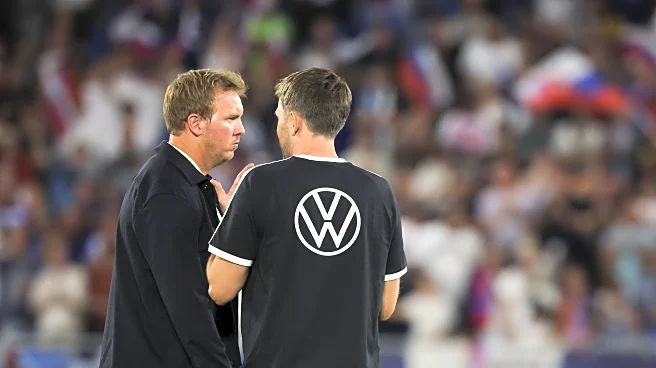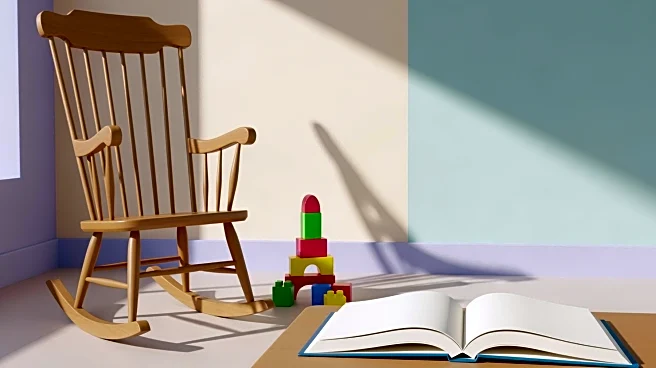Insipid, uninspiring, anonymous. Got any other adjectives for the German men’s national team lately?
“It wasn’t just disappointing, it was a lifeless performance,” lamented DFB director Rudi Völler after
Germany’s stunning 2-0 loss to Slovakia.
After all the anticipation, all the momentum coming out of EURO 2024, and all the talk about World Cup trophy goals…Julian Nagelsmann’s Germany side came out flat. The easy favorites in Group A of World Cup qualifying are now in every-game-is-a-knockout territory. How did it happen?
The selection
Nagelsmann, the former Bayern Munich head coach, made statements with both his squad selection and XI. Out was explosive winger Leroy Sané after an admittedly puzzling step down to the Turkish Süper Lig this summer. In the roster were exciting young players like Mainz attacking midfielder Paul Nebel, who did not feature on Thursday.
This is a Germany team missing several of its key players — notably, Bayern sensation Jamal Musiala, who can make magic out of any situation seemingly on his own, and Arsenal forward Kai Havertz, whose all-for-the-team work at the number nine is consistently underappreciated, except by all of his managers. Big losses, no doubt, but it’s not as if the German talent pool is empty.
Against Slovakia, Nagelsmann called up the likes of Leon Goretzka and Serge Gnabry to shore up the absences — national team veterans still starting and starring for one of the biggest clubs in the world. By moving Joshua Kimmich to midfield and starting Jonathan Tah in defense, the Bayern spine in the team was as well-represented as ever…but strong, it was not.
Nagelsmann talked tough regarding Bayern youngster Aleksandar Pavlović and his recent dip in playing time. The 21-year-old is just making his comeback, starting or coming off the bench for Vincent Kompany, but was left to train at Säbener Straße this week (alongside friend and mentor Thomas Müller, incidentally). When he was last with the national team, Pavlović looked to be forming a dynamic duo with VfB Stuttgart’s Angelo Stiller, another young gun and Bayern youth product. Now that project seems to have stalled, perhaps for good, with the likes of captain and leader Joshua Kimmich installed back in the pivot.
What has Kimmich’s move to midfield left at right-back? Nagelsmann did not sound upbeat about the position group at all. RB Leipzig’s Ridle Baku and Stuttgart’s Josha Vagnoman were left at home, and Eintracht Frankfurt defender Nnamdi Collins was tapped to start. By half-time, Collins was hauled off for a second left-back David Raum, and the starting left-back Maximilian Mittelstädt was shifted over in his place.
The tactics
So let’s talk about those tactics. Collins, a center-back/full-back profile dating back to his Borussia Dortmund days, was instead given similar license to bomb forward as the left-back on the opposite flank. Rather than asymmetry — think Benjamin Pavard’s right to Alphonso Davies on the left from Nagelsmann’s Bayern days — it was two wing-backs getting high and providing width to offer service into the box.
But Nagelsmann still favored building out of a three, and that meant Kimmich dropping in — usually as the right-sided center-back, but also occasionally from his favored central position, where he can see more of the field and influence more of the game. So the theory goes: and Kimmich was sharp with his passing, connecting on all three of his long ball attempts while shipping an 84/87 pass rate (not including crosses), per Sofascore. It was stable and it was tempo-setting but not very adventurous, as the pass-map shows:
To allow Collins to roam up as the advanced winger, Serge Gnabry spent a lot of the match dropping down into the second or third lines on the right. The nominal winger finished with few touches and influence in the final third and no shots attempted.
Instead, Germany were most lively working down the left flank. Liverpool’s new No. 10 Florian Wirtz was an energetic presence cutting in from the wing, but he did have to cut in and Slovakia compacted the central areas nicely. The wing-backs owning the flanks, Raum and Mittelstädt, completed a combined one (1) cross out of nine attempts. Attacking midfielders Leon Goretzka and Nadiem Amiri made forays into the box but could not unlock the defense, either; either the vision and trickery of Wirtz was needed there or the presence of a talisman such as Musiala was too big a miss.
Germany finished the game with 70% possession and having put on a masterclass in how to ‘dominate’ on the ball while offering nearly nothing going forward. Apart from a handful of tight-space central combinations that didn’t look that close to coming off anyway, it was a lot of speculative crossing, and very little threat on Martin Dúbravka’s goal.
On the other end, Oliver Baumann didn’t have nearly as good a time. Who was meant to cover the spaces in behind, particularly on the right flank? — was it Kimmich, Collins, Gnabry? Germany got overrun with ease, both through the midfield and down the wings. Kimmich found himself the lone man trailing behind two runners in the build-up to Slovakia’s opener; no longer the right-back yet still the closest thing to one, just further out of position than he otherwise might have been.
After the match, Nagelsmann called Feyenoord’s Leo Sauer the “best player on the pitch”, but it is also true that the 19-year-old was given a splendid opportunity to shine.
The energy…or the quality?
Joshua Kimmich echoed his coach and the German football director’s warnings to the team in the aftermath, calling for “courage and attitude” — two qualities he identified as totally lacking against Slovakia.
It is impossible to argue against it. Only one of the teams looked lively and it was not Germany. Prior to the match, there had been talk — and criticism — of Germany’s World Cup title ambitions next summer. Julian Nagelsmann spoke earlier in the week about “showing dominance” and “leaving no room for doubt.” On matchday, the Germans showed up looking indeed like a side fully expecting to walk the group, already with one eye and one hand grasping towards the trophy of a competition they have not yet qualified for.
But more worrying still were the long-time stars like Rüdiger who — were made to look past it. The Real Madrid star was as fiery and combative as he ever was, charging up the field to make challenges and…getting brushed off and swept aside. On the second goal, Rüdiger found himself defending one-on-one against Middelsbrough forward David Strelec — signed days ago from Slovan Bratislava — and getting rinsed inside and out on the way to a spectacular curling shot into the top corner.

In defense, at least, the Germans don’t have a deep well of proven talent. If Tah and Rüdiger are struggling, behind them there are guys like Robin Koch and Waldemar Anton, who have been around the national team setup for years — Koch was in the Joachim Löw’s EURO 2020 squad in 2021 — without ever really breaking through.
If there’s a way to compensate for that — a system where your center-backs don’t need to be heroes or otherwise look like chumps getting wrecked on the break — Germany look a million miles away from it, too.
The verdict
The bottom line? The coach is responsible for all of this.
I am a Nagelsmann fan, and a believer in patience and understanding on the days when things just don’t come together. But there was so very little to defend about the Slovakia result. It seemed like a vindication of every critic who sniffed at the results of last summer, or who questioned whether Nagelsmann was talking too much about the next summer rather than making the necessary developments in the here and now.
After the match, Nagelsmann berated his players and posed the question: if Slovakia can show that kind of fight, maybe he should be calling up players with “less quality” but who would “give their all” for Germany.
The problem is that while you can keep talking about getting Johnny Freshman from Foxborough High — or the Bavarian equivalent — you also start giving people the notion that you don’t need a mad scientist advanced tactician at head coach. You can just get a coach with the right grit and connection to his players, and to German football, to keep his sides locked in instead of…well, whatever that was on Thursday.
Nagelsmann rode a wave of positive energy into EURO 2024 — a home-turf tournament where Germany just about got it together starting in March after an unsettling experimentation period the autumn before. The next World Cup will not be at home, and the kind of motivation and urgency that brings cannot be replicated. Nagelsmann needs to show he can do it anyway, or he’ll join what is getting to be a long line of tactically excellent German coaches fielding teams full of big names that failed anyway.
Let’s hope Sunday is a big, if belated, step in the right direction.
The German national team hit the road to face Slovakia, looking to get off on the right foot for this round of World Cup qualifier action.
That did not happen.
Julian Nagelsmann — as he is prone to do — did some experimenting with his lineup and it did not work as the team dropped a 2-0 decision. The players were bad, the coaching was not great, and it was not a banner effort overall.
There is plenty to discuss from this match, so let’s get to it. This is what we have on tap for this edition of the Bavarian Podcast Works — Postgame Show:
- A look at the starting XI.
- A rundown of the scoring and substitutions.
- Some final thoughts and takeaways on the match.









